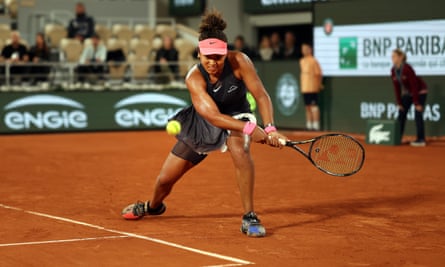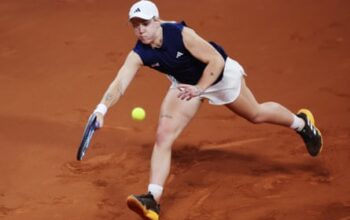As Iga Swiatek took her first steps on the WTA tour in 2019, one of her early breakthrough tournaments in Toronto culminated in a meeting with Naomi Osaka.
Back then Osaka was at the height of her powers and Swiatek an 18-year-old rookie, but they battled as equals and Osaka narrowly won. Both players departed the court recognising each other as both new rivals and kindred spirits.
So much has changed in the past five years, but on Wednesday evening the sleeping rivalry of women’s tennis came alive on one of the greatest stages in the world as Swiatek and Osaka fought for three hours in Paris.
This time as the challenger, Osaka played a spectacular match and came within a point of a stunning upset but Swiatek demonstrated her supreme resilience by recovering to reach the third round of the French Open with an incredible 7-6 (1), 1-6, 7-5 win.
“It’s much more intense for the second round than I ever expected,” said Swiatek. “Naomi played amazing tennis, sometimes risking a lot. Maybe she’s gonna be a clay court specialist. I’m happy that she’s back and she’s playing well.”
With her victory, Swiatek’s bid for a third consecutive French Open title and fourth overall remains alive. While she has built a reputation for her tendency to destroy her opponents, the world No 1 has also shown that she has become one of the most durable and mentally tough players on the tour.
Three weeks after she saved three match points to defeat Aryna Sabalenka in the final of the Madrid Open, Swiatek once again found a way through.
In the years since their first meeting, Swiatek has established herself at the very top of the sport, equalling Osaka’s grand slam count with four titles and marking her ground as the dominant figure.
While Osaka is ranked No 134 and has been slowly finding her feet on the tour again, Swiatek is the world No 1 by more than 3,500 points, winning both Madrid and Rome tournaments in the build-up to Roland Garros.
Despite the hype around a second-round match between the two most successful players in the women’s draw, few expected Osaka to have a significant chance against Swiatek under these circumstances.

But it was clear from the very beginning that Osaka stepped on to Court Philippe-Chatrier to battle. Even as Swiatek smothered Osaka’s second serve and exposed her awkward movement on clay with her spin and angles, the Japanese player settled down and began to pulverise the ball, rushing the Swiatek forehand while serving precisely and consistently over 115mph.
Soon, it was Swiatek who was tense, her error count rising sharply, as Osaka retrieved the break and reached set point on Osaka’s serve. Down set point at 4-5, Swiatek dragged herself back into the set, locked down her game and took the set on a one-sided tie-break.
Despite her disappointment after the first set, Osaka continued to grow into the match. Her first serve became more precise and the more confident she became, the earlier in the point Osaka launched herself into nuclear forehands. As Swiatek’s error count increased, Osaka rolled through the second set before establishing 5-2, 0-30 on Swiatek’s serve in the deciding set.
after newsletter promotion
But as Osaka neared victory, she froze. At 5-3, Osaka held match point at Ad-40 on her serve, which Swiatek scuppered with a brilliant angled backhand return before retrieving the break.
From that seemingly insurmountable deficit, Swiatek refused to offer up any more free points. Slowly but methodically, she turned the match around, reeling off the final five games to take the match.
As she processed another incredible escape, Swiatek used her on-court interview to criticise the crowd’s conduct. “But sometimes under a lot of pressure when you scream something during the rally or right before the return, it’s really, really hard to be focused,” she said.
“I usually don’t bring this up because I want to be this kind of player that is in the zone and really focused. This is serious for us, we are fighting our whole lives to be better and better. Sometimes it’s hard to accept that.”
For Osaka, by far the best performance of her comeback from maternity leave ends in heartbreak, but as she faced the press Osaka recognised the clear progress she had made. There will be more to come.
“I cried when I got off the court, but then, for me, I kind of realised I was watching Iga win this tournament last year, and I was pregnant,” she said.
“It was just my dream to be able to play her. When I kind of think of it like that, I think I’m doing pretty well. And I’m also just trying not to be too hard on myself. I feel like I played her on her better surface. I’m a hard-court kid, so I would love to play her on my surface and see what happens.”


